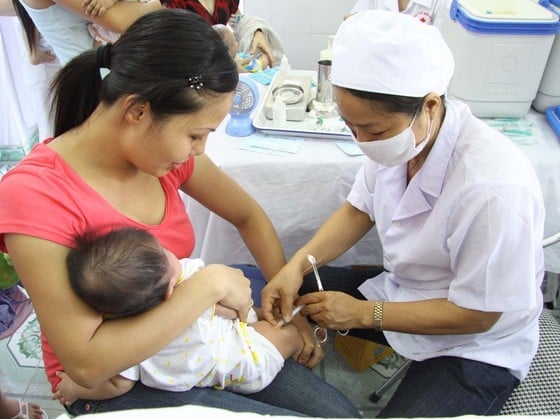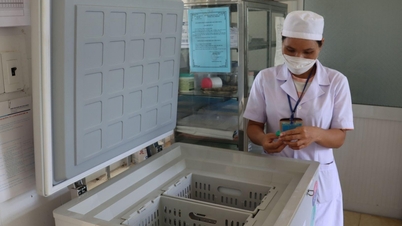SGGPO
According to the Ho Chi Minh City Department of Health , the DPT-VGB-HiB vaccine was last supplied in October 2022 and ran out in early March 2023, while the DPT vaccine was last supplied in February 2023 and ran out in early May 2023.
 |
| Healthcare workers administer vaccines to children. |
On May 16th, the Ho Chi Minh City Department of Health announced that as of May 15th, all vaccination facilities in the city had completely run out of DPT-VGB-HiB vaccine (a 5-in-1 combination vaccine protecting against diphtheria, pertussis, tetanus, hepatitis B, Hib pneumonia, and Hib meningitis) and DPT (a vaccine protecting against three infectious diseases: diphtheria, pertussis, and tetanus) in the Expanded Immunization Program (EIP).
According to the Ho Chi Minh City Department of Health, the DPT-VGB-HiB vaccine was last supplied in October 2022 and ran out in early March 2023. The DPT vaccine was last supplied in February 2023 and ran out in early May 2023. Other vaccines in the Expanded Immunization Program are only available in very limited quantities and are expected to run out in the next few months if no further supplies are provided.
Specifically, by the end of May 2023, the city will run out of Hepatitis B and Japanese encephalitis vaccines; by mid-June 2023, the tuberculosis vaccine (BCG) will be gone; by July 2023, the polio vaccine (bOPV) and measles vaccine will be gone; by August 2023, the tetanus vaccine (VAT) will be gone; and by the end of September 2023, the measles and rubella (MR) vaccine will be gone.
Previously, the Department of Health directed the Ho Chi Minh City Center for Disease Control (HCDC) to report monthly vaccine forecasts for the Expanded Immunization Program to the Southern Regional Expanded Immunization Program Project (managed by the Pasteur Institute of Ho Chi Minh City), and received vaccine supplies from the Institute every two months.
The last time HCDC received vaccines was on April 24, 2023 (including BCG, bOPV, Japanese encephalitis, measles, tetanus, and hepatitis B vaccines).
According to the Ho Chi Minh City Department of Health, the current temporary disruption in the supply of some vaccines under the Expanded Immunization Program in Ho Chi Minh City is unavoidable. The Department of Health has instructed immunization centers in the area to maintain regular operations according to fixed schedules to administer the remaining vaccines; at the same time, they are compiling a list of children due for vaccination but who have not yet been vaccinated, so that they can be invited to receive vaccinations as soon as the vaccines are supplied again.
"We earnestly hope that the National Institute of Hygiene and Epidemiology will soon resume supplying vaccines under the Expanded Immunization Program," a representative from the Ho Chi Minh City Department of Health requested, adding that vaccines under the Expanded Immunization Program play a crucial role in protecting children's health and controlling disease outbreaks in the community. To provide the best protection for children, vaccines must be administered on schedule and in the correct dosage. If the vaccination schedule is interrupted, children should receive catch-up vaccinations as soon as possible.
The Expanded Immunization Program (EIP) was launched in Vietnam in 1981 by the Ministry of Health with support from the World Health Organization (WHO) and the United Nations Children's Fund (UNICEF). The program's initial goal was to provide free immunization services for children under one year old, protecting them from six common and highly fatal infectious diseases.
After a pilot phase, the Expanded Immunization Program (EIP) was gradually expanded in both geographical scope and target population. From 1985 to the present, all children under one year old nationwide have had access to the EIP.
By 2010, 11 vaccines against common and dangerous infectious diseases in children had been included in the Expanded Immunization Program, including vaccines against tuberculosis, diphtheria, pertussis, tetanus, polio, hepatitis B, measles, Japanese encephalitis, cholera, typhoid, and pneumonia/meningitis caused by Hib.
Source





![[Photo] Prime Minister Pham Minh Chinh presides over a meeting on private sector economic development.](/_next/image?url=https%3A%2F%2Fvphoto.vietnam.vn%2Fthumb%2F1200x675%2Fvietnam%2Fresource%2FIMAGE%2F2025%2F12%2F20%2F1766237501876_thiet-ke-chua-co-ten-40-png.webp&w=3840&q=75)

![[Photo] Prime Minister Pham Minh Chinh presides over the conference announcing the establishment of the International Finance Centre in Vietnam.](/_next/image?url=https%3A%2F%2Fvphoto.vietnam.vn%2Fthumb%2F1200x675%2Fvietnam%2Fresource%2FIMAGE%2F2025%2F12%2F21%2F1766309817714_ndo_br_dsc-3400-jpg.webp&w=3840&q=75)


























































































Comment (0)